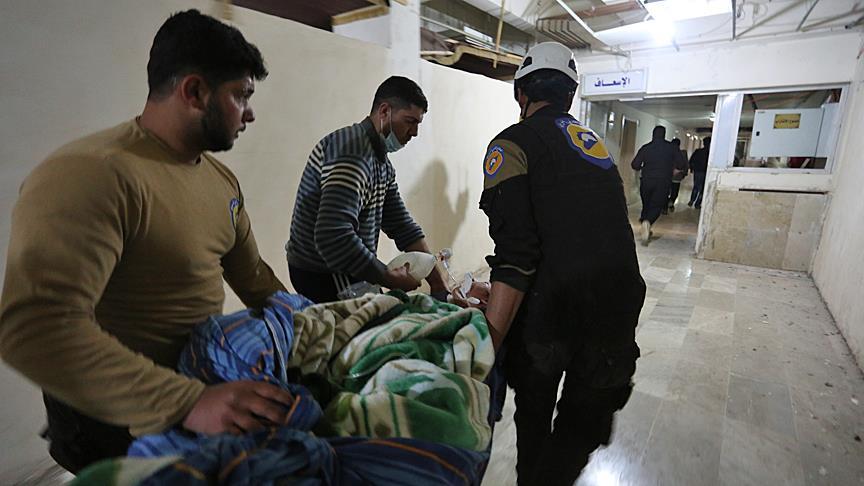Regime chlorine gas attack kills 100 in Syria’s Idlib
UK, France call for emergency meeting of UN Security Council
 Syrians carry the patients to safer zones after airstrikes hit National hospital in Maret el Numan district of Idlib, Syria on April 2, 2017. (Mohammed Karkas - Anadolu Agency)
Syrians carry the patients to safer zones after airstrikes hit National hospital in Maret el Numan district of Idlib, Syria on April 2, 2017. (Mohammed Karkas - Anadolu Agency)
By Mohamad Misto and Adham Kako
IDLIB, Syria
At least 100 people were killed Tuesday when Assad regime warplanes carried out a chlorine gas attack in Syria’s northwestern Idlib province, according to Syrian opposition Health Minister Firas
“The raids left over 100 people dead and 500 civilians, mostly children, injured,”
The UN Security Council will convene Wednesday morning for an emergency meeting, Nikki Haley, U.S. ambassador to the global body, told reporters Tuesday.
“Many children were among the victims,” he said, adding that he expects the death toll to rise.
A local civil defense official earlier told Anadolu Agency a regime aircraft carried out a chlorine gas attack on the town early Tuesday.
Tuesday’s attack came one day after a regime aircraft carried out a similar chlorine gas attack on Idlib’s town of Al-Habit, hurting dozens.
The gas attack was swiftly condemned by British Foreign Secretary Boris Johnson, as well as other world leaders.
"Horrific reports of chemical weapons attack in Idlib, Syria.
Britain’s Ambassador to the UN Matthew Rycroft told reporters Tuesday the attack was "clearly a war crime" and bore "all the hallmarks of a regime attack.
"It is clearly very bad news for peace in Syria," he said, adding: "But it demonstrates once again that the regime will stop at nothing to remain in power, even the use of the most heinous weapons imaginable."
Erdogan to Putin: Syria chemical attack 'unacceptable'
Chemical attacks on Syrian opposition-held Idlib were “inhuman” and “unacceptable”, President Recep Tayyip Erdogan told his Russian counterpart Vladimir Putin on Tuesday.
According to the Turkish presidency, Erdogan held a telephone conversation with the Russian leader to discuss Tuesday’s incident.
More than 100 civilians were killed and 500 others, mostly children, have been affected by the chlorine gas attack carried out by regime warplanes in Khan
“These kind of inhuman attacks are unacceptable,” Erdogan told Putin.
Both leaders stressed the need to strengthen cooperation in the fight against terrorism
They also agreed further efforts should be taken to maintain the fragile Syrian ceasefire.
Idlib attack is 'crime against humanity': Turkish FM
Foreign Minister Mevlut Cavusoglu has described a deadly chemical attack in northern Syria as “a crime against humanity”.
Speaking in Turkey's western province of Isparta on Tuesday, Cavusoglu said women and children were among the dead in Syria's northwestern Idlib province.
The use of chlorine gas has been blamed on the Syrian regime.
"This is a crime against humanity and there should be a punishment for this. But I am sure that the Western world which tries to teach human rights but showed impassivity when the red line was crossed before will try to cover this up again too," Cavusoglu said.
He said it was not the first such chemical attack by the Syrian regime.
"Chemical weapons were a red line for the whole world, but it became routine... After the truce, violations were occasionally occurring, but this is obviously a very serious violation," he added.
A cease-fire brokered by Turkey and Russia came into effect in Syria late last year.
Cease-fire violated
Turkish presidential spokesman Ibrahim Kalin also strongly condemned the attack in Syria as a “war crime” and “crime against humanity”.

Kalin stated the regime of Bashar al-Assad has violated the ongoing cease-fire agreement brokered by Turkey,
He called on the international community to take necessary steps against the
Syrian regime forces are believed to have launched gas attacks on opposition-held areas in recent weeks.
On March 30, 35 civilians were affected by a chlorine gas attack carried out by regime forces in Al-Qaboun near Damascus.
Last year, a UN-appointed investigation panel found that chemical weapons were used by regime forces and opposition fighters in 2014 and 2015. However, no actionable steps were taken.
Chlorine gas is one of several elements and compounds used in devastating chemical
Since March 2011, the Syrian opposition has demanded an end to more than 44 years of Assad family’s rule and the establishment of a democratic state.
The Syrian regime responded to the protests with military force, pushing the country into a vicious downward spiral of violence, bloody battles and a civil war that is still ongoing between the regime and opposition forces.
Since then, more than a quarter of a million people have been killed and more than 10 million displaced across the war-battered country, according to the UN.
The Syrian Center for Policy Research, however, puts the death toll from the six-year conflict at more than 470,000 people.
* Ali Murat













